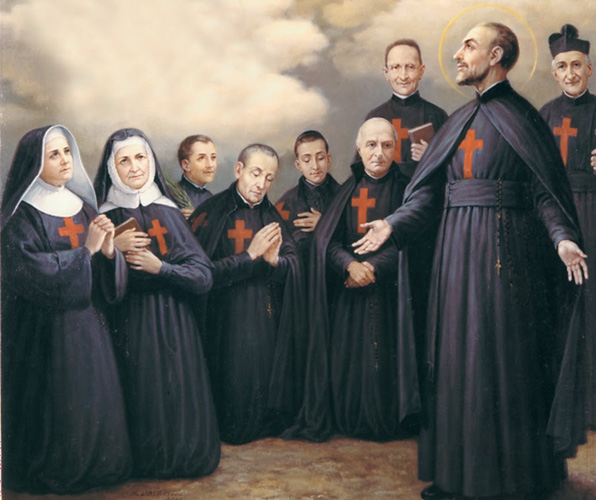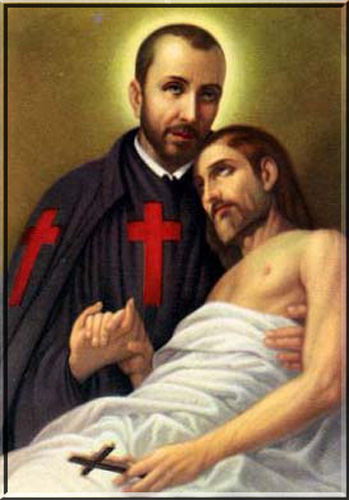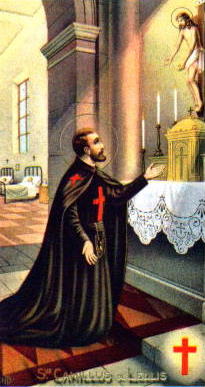
St. Camillus de Lellis, founder of the Order of Clerks Regular, better known as the Camillians, minister to the infirm.
"Charity is patient, is kind: charity envieth not, dealeth not perversely; is not puffed up; Is not ambitious, seeketh not her own, is not provoked to anger, thinketh no evil; Rejoiceth not in iniquity, but rejoiceth with the truth; Beareth all things, believeth all things, hopeth all things, endureth all things." 1 Corinthians 13: 4-7  St. Camillus of Lellis
St. Camillus of Lellisby Fr. Francis Xavier Weninger, 1877
On the Festival of the Holy Apostles, St. Peter and St, Paul,
in the year 1746, Benedict XIV., with great solemnity, canonized
Camillus, the founder of the congregation of regular priests,
who, besides the three usual vows, bound themselves especially
to serve the sick. Camillus was born in 1550, in the diocese of
Theatie, in the kingdom of Naples. His mother dreamed before
he was born, that she had given birth to a boy, who wore upon
his breast a cross, and who was followed by a great many other
boys, who wore the same emblem. The signification of this
dream was not recognized until St. Camillus had founded an
order, whose members, in consequence of a decree of the Pope,
wore a dark red cross on the right side of the breast. The first
years of his life were spent piously under the eyes of his parents;
but later he became so addicted to games of chance, that he not
only lost all he possessed, but also visibly injured his health.
Obliged by poverty, he hired himself as nurse in a hospital, but
soon becoming tired of this, he joined the army. The life of a
soldier pleased him still less, and he therefore took service in a
Capuchin cloister, not knowing what other course to pursue.
PRACTICAL CONSIDERATIONSGod at length had compassion on the lost sheep, and once more led him upon the right road. The cause of this was a sermon which he heard by chance, and even against his will. Pondering on it, he suddenly recognized his iniquities, and the judgment which he had to expect on account of them, and casting himself on the ground, he bitterly bewailed his past life, and resolved most earnestly to change it. From that moment, he appeared a different man, and having made a sorrowful confession, he not only avoided every shadow of sin, but also desired to be admitted into the seraphic order of St. Francis. He was received, but dismissed again before his probation had ended, in consequence of a sore on one of his feet, from which he had suffered a long time, and which made it impossible for him to perform the work assigned him. Sadly disappointed, Camillus went to Rome, to the hospital of St. James, where, as mentioned above, he had served for a time. God so directed it, that he was entrusted with the administration of the finances; in which office he consecrated himself entirely to the sick. Perceiving that the hired nurses performed their duties with negligence, he deliberated within himself, how he might obtain nurses, who, to receive an eternal recompense, should, after his example, wait upon the sick. Consulting St. Philip Neri, who was then living at Rome, he founded a society to which were admitted only those who were willing to serve the sick without any temporal reward. This society at first consisted of only a few secular persons ; but these were soon joined by several priests, who bought themselves a house in which they might reside in common. This society formed itself into a religious order, and it spread as well over Italy and Sicily, as over other parts of Europe. The members of it nursed the sick, day and night, as well in hospitals as in private houses, and gave them every assistance, as well temporal as spiritual. St. Camillus was an example to all. Exhorted by St. Philip Neri, he had followed the example of St. Ignatius, and though already advanced in years, had devoted himself to study and was ordained priest, that he might assist the sick spiritually as well as corporally. The bull of his canonization proves that the most devoted mother could not have nursed her only child with greater love, than St. Camillus bestowed without exception upon all the sick. Whenever one was found, he went to comfort and to cheer him: he gave medicine, cleansed the bed and room, bandaged wounds, and in one word, did all that charity could think of or the condition of the sick require. Thus he acted uniformly towards all, but especially towards those who awakened in others aversion, on account of many sores, bad odors, or other disgusting circumstances. He often remained whole nights, without food or sleep, with them, although greatly suffering himself from the sore on his foot, to which we have alluded above. More than once he was so exhausted by his labors, that he fainted away by the side of the sick; but he continued in his work of love, while he had any strength left. At the time of a terrible pestilence which ravaged Rome and several other cities, he worked real miracles of Christian charity. He went with his brethren through all the streets, assisting the suffering. He carried many, whom he found lying in the streets, stricken down by the pestilence, into the house where he and his priests resided, and nursed them there most tenderly, without in the least fearing death or infection. The same zeal he manifested at Milan and Nola, whither he went to nurse the sick at the time of the pestilence. He was incited to these great sacrifices by the love of God, which, since his conversion, inflamed his whole heart. He desired to gain numberless souls, to awaken in them an equal love to God and hatred of sin. Hence, his first care was that the sick should reconcile themselves to their Maker, by confession, and bear their sufferings patiently. The whole life of this Saint was, according to the above mentioned bull, truly divine. At the time of prayer they often found him in ecstacy, and surrounded by a heavenly light, or raised high up from the ground. St. Philip Neri gave evidence that he frequently saw angels standing beside St. Camillus while they waited upon the sick. God graced him also, with the gift of prophecy, and of miraculously restoring the sick in an instant, of which his life offers many examples. The Inhabitants of Rome, therefore, looked upon him as a Saint, and greatly esteemed him ; he, however, humbled himself beneath all on account of the sins of his youth, over which he daily wept bitterly; he deemed himself unworthy to live among men. He esteemed and called himself the greatest sinner, who had deserved hell a thousand times. To praise him was only to rouse his indignation or to sadden him. He firmly refused the name of Founder of a religious order, and although for twenty-seven years he discharged the functions of an Abbot, he rested not until he was allowed to resign the office, and live under the obedience of another. St. Camillus united with profound humility and desire to obey, the virtue of mortification. Notwithstanding the great hardship of nursing the sick, and the pain that for years his foot gave him, he mortified his body by continual fasting, watching, and other penances, in such a manner that the prolongation of his life was regarded as a real miracle. A happy death ended, at last, his holy and useful life. In the year 1614, at the age of 60, after he had endured for 33 months, a most painful malady. The thought of the torments of hell which he had merited by his transgressions, made, according to his own words, all suffering easy to bear. Before his end, he admonished his brethren to continue in their work of love to God and men. The many miracles that have taken place since his death by his intercession, have made the name of St. Camillus famous over the whole Christian world.
St. Camillus was for sometime in his youth, addicted to gambling,
and on account of it, not only his fortune had suffered, but also
his health. This fault he corrected later, and weeping over it as long as
he lived, he spent his remaining years in prayer and constant works
of Christian charity. Playing is in itself no sin, if it is honest, not
overstepping proper bounds, and is not done with sinful intentions. But it
is also sure that by play we can commit not only venial, but mortal sin:
first, if the play is dishonest, or such as gives occasion to mortal sin:
secondly, if we give too much time to play, like it immoderately, or
make a habit of it, neglecting, in consequence of it, the duties of our
office, or station in life: or if by it we do considerable damage to our
temporal affairs; thirdly, when we play only because we do not love to work,
or from an unbounded love of money or from any similar cause ; fourthly,
when we know that play will lead us to cursing, blaspheming, lying,
&c; finally, when we tempt others to dishonest or otherwise sinful plays.
Prayer from the Liturgical YearIf you have done wrong in such a manner, correct it earnestly while time is left you: it will otherwise harm you more than you imagine. St. Francis Borgia used to say that play carried with it a three-fold injury: for we lose by it, first our money, secondly, our time; thirdly, our devotion and recollection. There may be some who do not lose money, but only time, which in itself is more unpardonable and injurious than if we lost all that we possess. This alone should prevent you from play: for, according to the words of St. Anthony: "As no temporal good is more precious than time, hence no loss can be greater, nor do us more harm." To this must be added the loss of devotion or recollection. Those who play are not devout. They prefer the game to devotional exercises, as experience teaches; and their conscience is generally soiled with many sins to which play either gives indirect occasion, or which occur during it. How terrible a damage for soul and body! Can the gain which we seek in gaming ever be a recompense for all this?. St. Camillus thought, while afflicted with his painful malady, of the torments of hell and by this eased his suffering. Follow his example. If you have to suffer, think of hell which you have oftener deserved than the Saint, and give thanks to God that He so graciously punishes you in this world, when He in accordance with divine justice, might have punished you so much more terribly. If your trials are hard to bear, say to yourself: "All my suffering is not yet that of hell: my pains are as nothing compared with the pains of hell." If your afflictions last long, cheer yourself with the thought: "My sorrows do not last as long as those of the damned in hell: my grief will end, but that of the damned never ends. How would those condemned rejoice and give thanks to God if their torments were not greater and lasted not longer than mine! "If you think and speak thus, no impatience will overpower you, much less will you begin to murmur and complain. One ought to give thanks to the Almighty," says St. Jerome, " and say always: "Praised be the Most High! I recognize that I suffer much less than I deserve. My suffering is small in comparison with my sins." from the Liturgical Year, 1909
Angel of charity, by what wonderful paths did the Divine Spirit lead thee! The vision of thy pious mother remained long unrealized; before taking on thee the holy Cross and enlisting comrades under that sacred sign, thou didst serve the odious tyrant, who will have none but slaves under his standard, and the passion of gambling was well nigh thy ruin.
O Camillus, remembering the danger thou didst incur, have pity on the unhappy slaves of passion; free them from the madness wherewith they risk, to the caprice of chance, their goods, their honour, and their peace in this world and in the next. Thy history proves the power of grace to break the strongest ties and alter the most inveterate habits: may these men, like thee, turn their bent towards God, and change their rashness into love of the dangers to which holy charity may expose them! For charity, too, has its risks, even the peril of life, as the Lord of charity laid down his life for us: a heavenly game of chance, which thou didst play so well that the very Angels applauded thee. But what is the hazarding of earthly life compared with the prize reserved for the winner? According to the commandment of the Gospel read by the Church in thy honour, may we all, like thee, love our brethren as Christ has loved us! Few, says St. Augustine, love one another to this end, that God may be all in all. Thou, O Camillus, having this love, didst exercise it by preference towards those suffering members of Christ's mystic Body, in whom our Lord revealed Himself more clearly to thee, and in whom His kingdom was nearer at hand. Therefore, has the Church in gratitude chosen thee, together with John of God, to be guardian of those homes for the suffering which she has founded with a mother's thoughtful care. Do honour to that Mother's confidence. Protect the hospitals against the attempts of an odious and incapable secularization, which, in its eagerness to lose the souls, sacrifices even the corporal well-being of the unhappy mortals committed to the care of its evil philanthropy. In order to meet our increasing miseries, multiply thy sons, and make them worthy to be assisted by Angels. Wherever we may be in this valley of exile when the hour of our last struggle sounds, make use of thy precious prerogative which the holy Liturgy honours today; help us, by the spirit of holy love, to vanquish the enemy and attain unto the heavenly crown! Amen.  Novena to St. Camillus of Lellis
Novena to St. Camillus of Lellis
Glorious St. Camillus, special patron of the sick, who during forty years didst devote thyself with truly heroic charity to the relief of their spiritual and temporal miseries: since holy Church has confided them to thy mighty protection, deign, from thy heavenly glory, to come now to their assistance. Obtain for them either the cure of their maladies, or patience and Christian resignation, that they may be strengthened and sanctified at the hour of their departure out of this world, and at the same time obtain for us the grace in life and death to imitate thee in the practice of divine love. Amen.
Our Father, etc. Hail Mary, etc.
(Two hundred days' indulgence once a day, applicable to the holy souls; Leo XIII., Feb. 27, 1894.) * Pope Leo XIII., in 1886, named him, as well as St. John of God "patron of all the hospitals and sick," and ordered their names to be inserted into the Church's Litany of the Dying. Care of the Sick
St. Camillus considered himself the servant of the sick, and wished the poor people to believe that he was entirely at their service. "Dear brother," he said to a sick man who had grown impatient and dissastisfied, "I beseech you for the love of Jesus Christ not to weep and lament any more; I am here ready to serve you, and to do whatever you order me, and be assured that I will not leave you till I see you perfectly satisfied."
Index of Prayers and Devotions for the Sick Index of Prayers and Devotions for the Dying http://catholicharboroffaithandmorals.com/ |